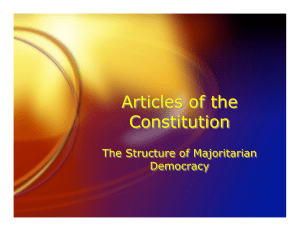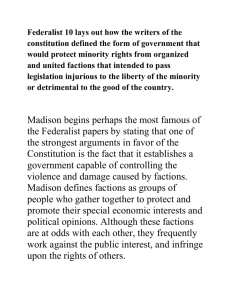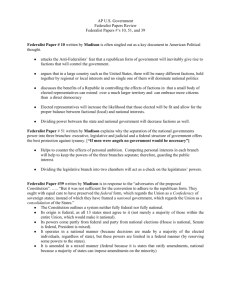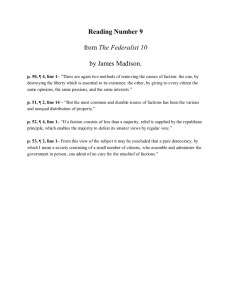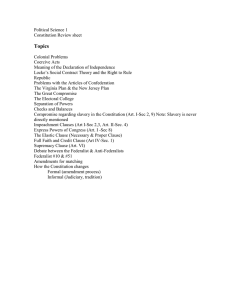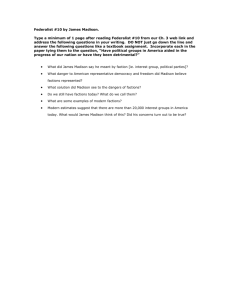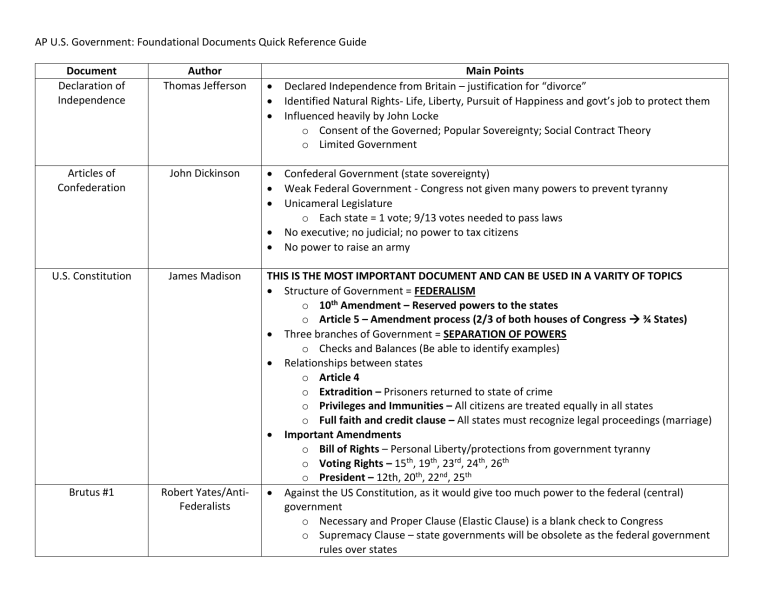
AP U.S. Government: Foundational Documents Quick Reference Guide Document Declaration of Independence Author Thomas Jefferson Articles of Confederation John Dickinson U.S. Constitution James Madison Brutus #1 Robert Yates/AntiFederalists Main Points Declared Independence from Britain – justification for “divorce” Identified Natural Rights- Life, Liberty, Pursuit of Happiness and govt’s job to protect them Influenced heavily by John Locke o Consent of the Governed; Popular Sovereignty; Social Contract Theory o Limited Government Confederal Government (state sovereignty) Weak Federal Government - Congress not given many powers to prevent tyranny Unicameral Legislature o Each state = 1 vote; 9/13 votes needed to pass laws No executive; no judicial; no power to tax citizens No power to raise an army THIS IS THE MOST IMPORTANT DOCUMENT AND CAN BE USED IN A VARITY OF TOPICS Structure of Government = FEDERALISM o 10th Amendment – Reserved powers to the states o Article 5 – Amendment process (2/3 of both houses of Congress ¾ States) Three branches of Government = SEPARATION OF POWERS o Checks and Balances (Be able to identify examples) Relationships between states o Article 4 o Extradition – Prisoners returned to state of crime o Privileges and Immunities – All citizens are treated equally in all states o Full faith and credit clause – All states must recognize legal proceedings (marriage) Important Amendments o Bill of Rights – Personal Liberty/protections from government tyranny o Voting Rights – 15th, 19th, 23rd, 24th, 26th o President – 12th, 20th, 22nd, 25th Against the US Constitution, as it would give too much power to the federal (central) government o Necessary and Proper Clause (Elastic Clause) is a blank check to Congress o Supremacy Clause – state governments will be obsolete as the federal government rules over states Federalist #10 James Madison Federalist #51 James Madison Federalist #70 Alexander Hamilton Federalist #78 Alexander Hamilton o Too large a country for Congress to represent local concerns; ineffective because too many views (factions) to form consensus Having a standing, permanent army is a destruction of personal liberty Once you give up power to the government the only way to get it back is by force Factions (Interest groups or Political Parties) are inevitable – cannot destroy them, so must manage them through frequent elections Large Republic is the best form of government to address factions – too difficult for any one faction to gain power; less likely for corruption o Indirect democracy – voting for ONE representative Pluralism – many factions competing for influence leads to only the best ideas being enacted Prevents tyranny of the majority Views of the people will be “refined and enlarged” by their elected representatives Power is divided between : o three branches of government, each w/ little control over the other o national & state government; House and Senate are divided & elected in different ways (back then) Checks and Balances – Gov’t must be powerful enough to control the people, but also to control itself – separate but equal powers All keep power from becoming too centralized- prevent one person/ one group from taking over the government “If men were angels, no government would be necessary” Argues for a single, “energetic” executive (president) o President must be a single person; having a dual executive or a committee will lead to confusion, disagreement, and inability to act decisively o Debate and disagreement are good for Congress, poison for the president. President needs to be able to act quickly and decisively to respond to crises Having a single president makes the executive easily accountable; multiple presidents = finger pointing and shifting blame “Least dangerous branch” – cannot enforce its decisions (no influence over “sword or purse”) Letter from a Birmingham Jail MLK Judiciary must be independent; life terms ensure justices are apolitical (otherwise they will be beholden to their appointers); qualified men won’t do the job if it is temporary Judicial review – job is to interpret the Constitution Justice delayed is justice denied; Injustice anywhere is a threat to justice everywhere All people should be treated the same under the law (14th Amendment Equal Protection Clause) Nonviolent direct action seeks to create an urgency for legislative action
